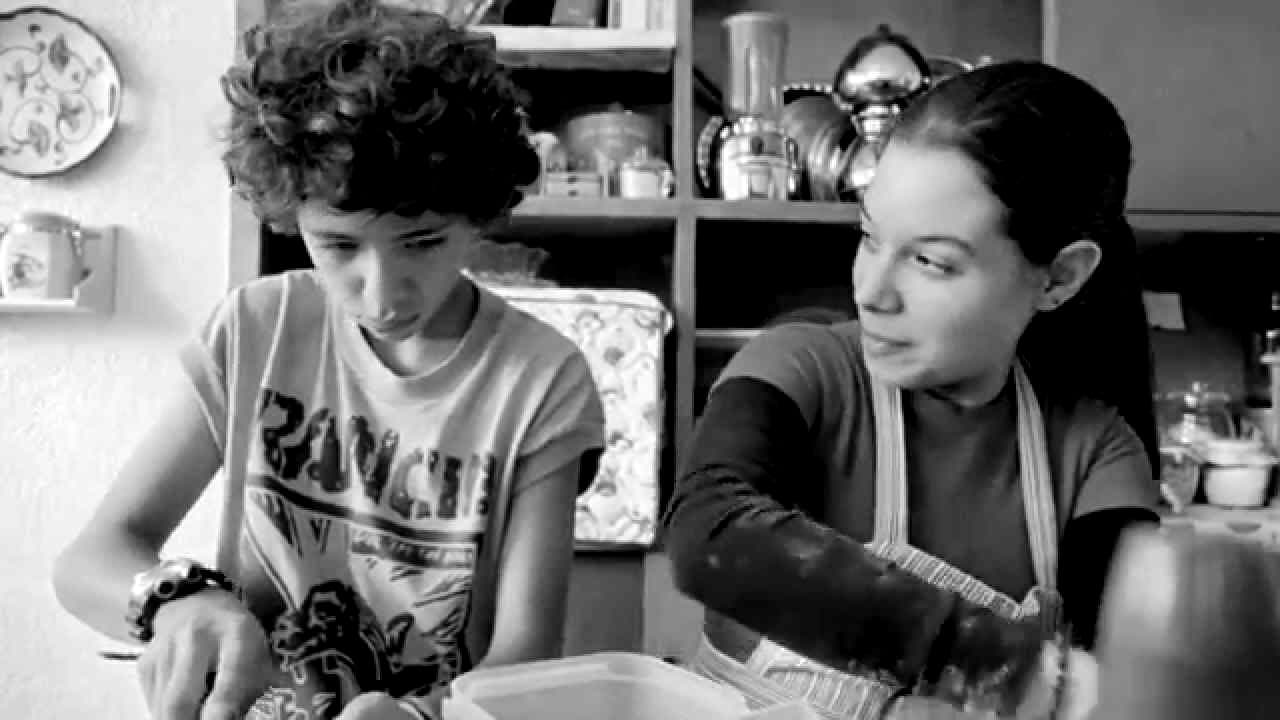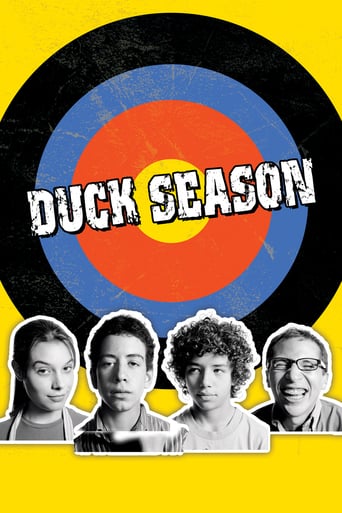

"Temporada de Patos" is a very frustrating film to watch. Again and again, the film appears to be about to do or say something profound...and again and again it falls flat. By the end of the film, I felt extremely annoyed as the story just didn't go much of anywhere.The setting is an apartment in Mexico and begins with a mother leaving home--with her teen and his friend there to spend the day. Through the course of the time they are there, a pizza guy shows up...and stays. The same goes for a neighbor teen, as she comes to bake a cake....but just stays. This story is done in black & white. The film has little energy and many times it COULD have gone interesting places. But, in most cases the story just doesn't go anywhere and instead of entertaining the film just leaves many viewers (like me) annoyed that more wasn't made of an interesting scenario.By the way, if you watch the film, and I don't advise you to do so, there is a scene with a stack of dead dogs....real dead dogs. Some viewers might have a hard time with seeing that.
... View MoreSimple and fresh. Those are the adjectives that better describe "Duck Season". A funny and genuine look at an ordinary Sunday afternoon in the life of two 14 year old kids, with video games, pizza, Coca Cola and the typical issues of early adolescence (the discovery of sexuality, parent's divorce, the loss of a friend, etc.), which anyone who was once 14 can relate to (specially guys, considering the two main characters). The film's simplicity, both technically and conceptually only make it more enjoyable and it's themes speak to pretty much everyone. The cast obviously contributes to that. Specially Diego Catano and Daniel Miranda, are both great and it's almost like they're not acting at all, of how real they seem. Just two best friends hanging out.It's easy and inevitable to link it to Kevin Smith's "Clerks", a 'sacred monster' of Indie film. Has that same approach to the often fascinating ordinarity of life, some hilarious and brilliant dialogues, and it's also done in Black and White. Like I said, this film is pure simplicity. There's no deep, philosophical purpose here, just watch for the fun, and maybe in the end you'll be able to unveil some 'message' in it.Two thumbs WAY up for Fernando Eimbcke! Hasn't been 'blessed' (at all) with the same opportunities and, consequently, recognition of the 'Three Amigos', his fellow countrymen (Inarritu, del Toro and Cuaron) but may very well be as talented as them, being as well a part of the freshness of this new generation of Mexican Cinema. Hope he has the chance to make some new films in a near future. For now, can't recommend "Duck Season" enough!
... View MoreMy uncle is actually Ulises, the pizza man, and me and my family were very proud when he won the Ariel. My name is Jorge Arreola, and funny enough, I am writing this from the computer at his house. The movie is awesome. Francisco Eimbcke is a genius. Some of the jokes are lost in translation, but watching the movie in Spanish without speaking it fluently is the same, and you will lose some of the jokes. All in all, this is one of my favorite movies of all time, not just because of my uncle. If you can't speak it, this movie is worth learning Spanish for. My uncle has a new movie coming out within the next year, Parpados Azules, and I suggest you see it as soon as you can, whether or not you speak Spanish.
... View Morecompared to some of the best movies out of Mexico, ( et tu mama etc.) this one is pretty tame. but I smell a rat here. first off, why does what is basically a teen movie get rated R? There is nothing hard core in this movie, NOTHING. I just can't figure the reason for the rating. Plus, I can't seem to find evidence to back me up on this, but, I believe the scene where the teen age boys are on the couch near the end of the movie was censored for the American version. In the very first scene in the movie when Moko is watching the other boy get dressed, it is obvious he has a sexual interest in him. And when they are both stoned later in the movie and alone on the sofa I think this scene went beyond holding hands and licking ears. Maybe I'm wrong, I don't know, but censorship in American is running rampant. The TV show, "With out a trace", being fined over a scene that didn't even happen, to me just shows what an era of repression we are experiencing. This is a harmless, funny little movie, it never should have been rated R, and if I am right about scenes being cut, then my attitude is: don't even show it in America. I don't want to see censored movies or TV or anything else. These neo-fascists want to determine what we can watch, that is bull crap, and I think it is about time we started to raise a little hell about it.
... View More